Agri-Technology
Marico Innovation Foundation at Work: Agri-Pilots, Circularity, and Global Climate Conversations
Scaling ideas, strengthening systems, and turning innovation into action across farms and climate platforms in India.
Women leaders across the Marico Innovation Foundation (MIF) network share what truly powers their journeys and what needs to change.

For generations, women have quietly powered India’s economy, often from the sidelines. Today, that is changing. Women entrepreneurs are building companies and creating solutions to some of India’s toughest challenges.
India has an estimated 15.7 million women-led enterprises. The World Bank estimates that closing the gender gap in employment and entrepreneurship could increase global GDP by up to 20%. Yet familiar barriers persist: access to early capital, networks and more. Women’s Entrepreneurship Day is a reminder that true economic acceleration is impossible without the full, unhindered participation of women.
At Marico Innovation Foundation (MIF), we work with innovators across sector. Today we spotlight women as teachers, collaborators, and catalysts. Women leaders are an integral part of our Mentorship Council, bringing deep expertise to the table. At our Scale-Up program, we also partner with women founders building solutions across sectors—from climate tech and packaging, to agriculture and social impact investing.
We asked women across our network to understand what truly powers their journeys and what India’s ecosystem must do next to accelerate women-led innovation.
We spoke to Zerocircle CEO Neha Jain, who is addressing the global plastics crisis with her company that makes seaweed-based biodegradable packaging; Craste co-founder Himansha Singh, whose company transforms low-value crop waste into sustainable boards and materials; Kheyti co-founder Saumya, who is building climate-smart solutions for smallholder farmers; Dr. Vaishali Gode, the Executive Vice President of R&D at Marico; Apurva Purohit, co-founder of Aazol and a member of the MIF governing council; and Ashu Suyash, founder and CEO of venture capital management company Colossa Ventures and member of MIF’s Governing Council.
If there is one quality women founders consistently embody, it is resilience, expressed differently in every journey.
For Apurva Purohit, it is a mix of determination and focus—the drive to keep looking for solutions, and the discipline to identify the right problems to solve. This lens has guided her from functional roles to business leadership, and now to building Aazol, a social impact business with women self-help groups as partners.
Neha Jain, calls her anchor “scientific optimism”—the belief that if evidence exists, a solution can be built. The mindset powers her team at Zerocircle to keep iterating their seaweed based materials, until they work in the real world, at scale.
For Himansha Singh, resilience is conviction backed by action. Building high performance boards from crop stubble meant taking on a market that had seen agri-based panels fail before. “Our product had to speak louder than us,” she says. And Craste did.
Saumya locates her resilience in purpose. At Kheyti, the belief that their work can help farmers live with greater dignity and stability keeps her steady through uncertainty.
Ashu Suyash brings a long horizon view. Over 35-years, her resilience has been shaped by conviction, perseverance, a clear plan, and unwavering family support. Starting Colossa Ventures required, in her words, “the grit to step away from a long corporate journey, the conviction to back women-led businesses, and the partnership with my co-founder to turn an intent into a catalytic investment platform.”
These leaders remind us that resilience is about persistence, clarity, and the unshakeable why.
Across conversations one structural gap surfaced repeatedly—the access to early trust.
Neha Jain points to something often invisible—the heightened fear of failure that weighs heavier on women because the consequences often extend beyond business. This, she believes, is why many women over-prepare and seek additional degrees or credentials before starting up. Her message to the ecosystem: “Write the first cheque,” let them make mistakes, and avoid “over mentoring”.
Himansha Singh is clear that women do not need special treatment, they need equal access. In sectors like construction and manufacturing, she has seen how long it can take to even secure a pilot, or be taken seriously on the factory floor. “The applause means nothing if no one gives you a stage.”

Apurva Purohit emphasises the need for funders, accelerators, and the ecosystem to approach women with empathy and intent. For her, the first step is building women’s confidence to think at scale—about funding, expansion and taking risks. That also means having more women on the funding and the accelerator side of the table.
From an investor standpoint, Ashu Suyash frames the solution in three parts: capital, capability, and confidence. With less than 2% of venture capital going to solo women founders, she calls for intentional capital allocation to the Women Economy, structured capability-building, and programs that combine funding with operating expertise, distribution pathways, and measurable pipelines.
At MIF, these insights feed into how we shape programs across the board.
Across their journeys, these women leaders show how leadership has sharpened in moments of risk.
Himansha chose to place her bet on product over pitch. Her team at Craste bootstrapped their first industrial line, produced 1,000 boards, and sold out immediately. Proof became their identity.
Saumya made her big leap when she returned to India after business school, taking on a substantial personal loan to start Kheyti while many peers chose secure corporate roles. The decision reframed how she defines success.
Apurva’s pivotal moment was taking on P&L ownership early in her career, which provided a 360-degree view of the business.
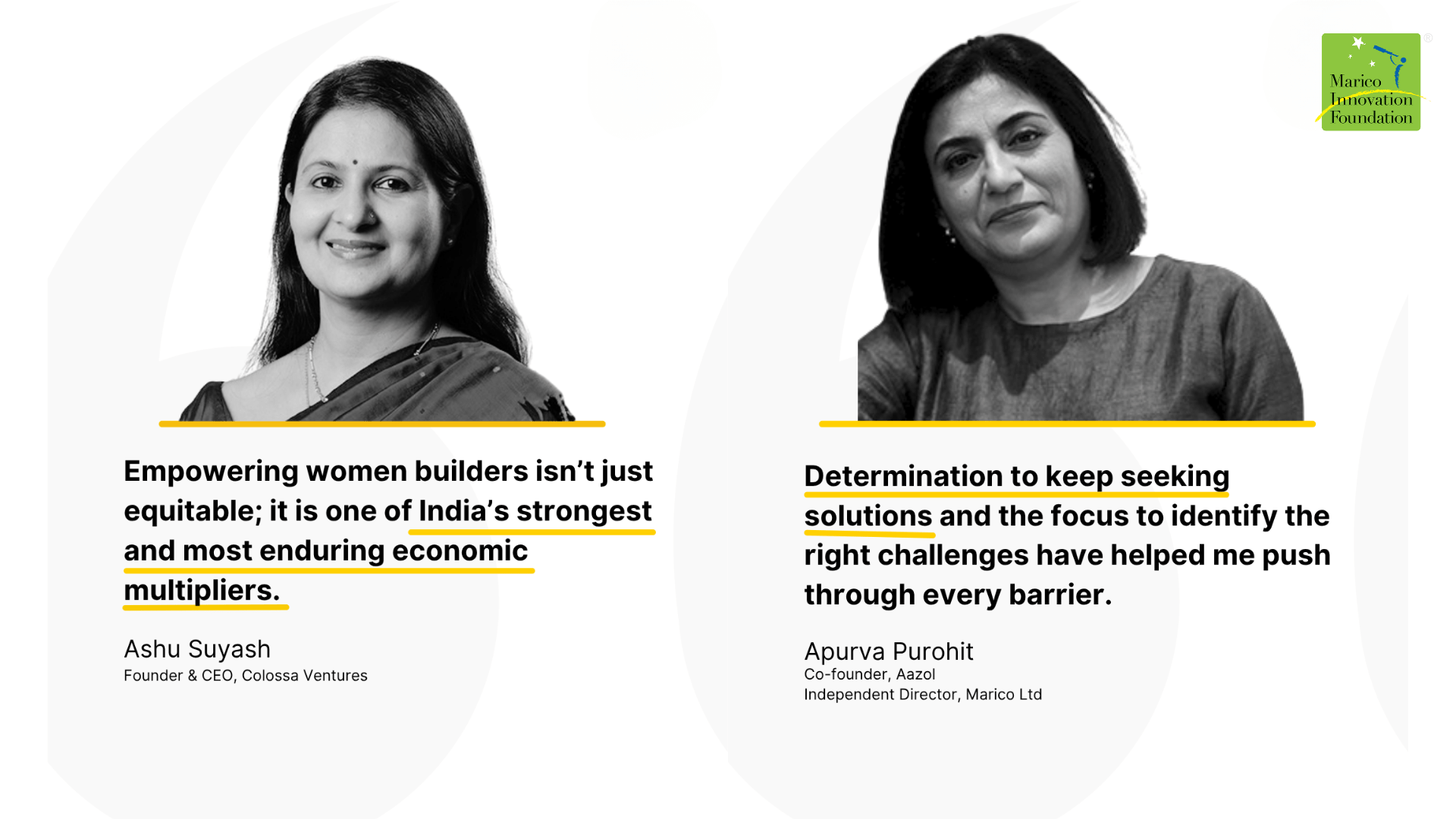
Neha took a different kind of leadership bet: choosing not to centralise every decision. As Zerocircle grew, she encouraged her team to take ownership, make their own calls—even if “a few things went south”.
It helped everyone learn faster and allowed her to focus on long term strategy rather than daily firefighting.
Ashu’s defining choice was stepping away from a CEO role to build Colossa Ventures. The move from institutional certainty in a well resourced environment to the uncertainty of a new platform underscored an important lesson: belief is not enough. It must be paired with relentless perseverance, humility, and the ability to listen closely to founder realities.
These choices show that leadership is not a title. It is a series of deliberate risks taken in service of something larger.
For many women entrepreneurs, the meaning of progress has shifted over time.
Apurva now defines progress not just by growth metrics but by sustainability—of the business, and the women self help group partners they work with. Meanwhile, for Himansha, progress is a future where she no longer has to justify her presence in the room. “I don’t see myself as a ‘woman innovator.’ I am an innovator — period.”
To Ashu, progress means redesigning systems so that belonging is never in question. For her, it must be measurable: more women raising follow-on rounds, more women in senior operating roles, more equitable capital allocation, and stronger exits that demonstrate that women-led innovation delivers superior returns at scale.
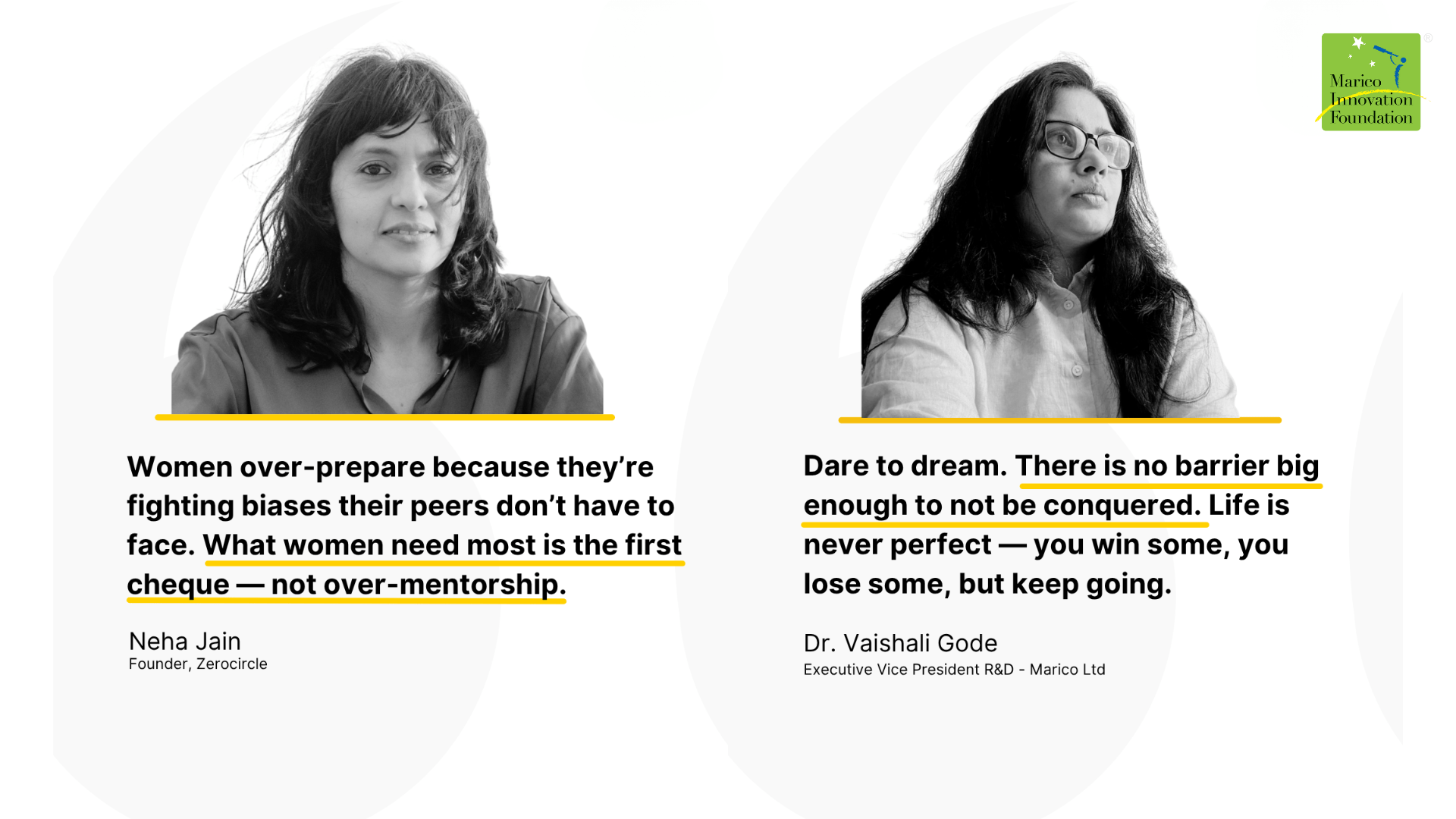
Saumya adds another layer—freedom. Progress, in her view, is the freedom for every woman to choose her path, pace and priorities. Her work at Kheyti keeps her close to the women at the grassroots who adapt, innovate, and lead. She believes the narrative will shift when women farmers are recognised as experts and leaders, not just beneficiaries.
Dr. Vaishali Gode, Executive Vice President-R&D at Marico reinforces these lessons:
For her, disruptive innovation is defined by one simple test: does it fundamentally change behaviour? Her framework for evaluating ideas is clear and practical:
Successful entrepreneurs, she says, share three Ps: purpose, passion, persistence. Her message to women entrepreneurs is equally powerful: dare to dream, because no barrier is unconquerable. Keep going.
As Suranjana Ghosh, Head of the Marico Innovation Foundation, puts it, “When women founders win, communities change, and so do balance sheets. As an ecosystem enabler, our job is to build systemic support and access to capital that allows more women entrepreneurs to thrive.”
As India advances, our progress hinges on how well we equip and amplify women entrepreneurs. At MIF, we are committed to learning from the journeys to shape our programs and create access, networks, and opportunities they need to lead India’s next great economic chapter.
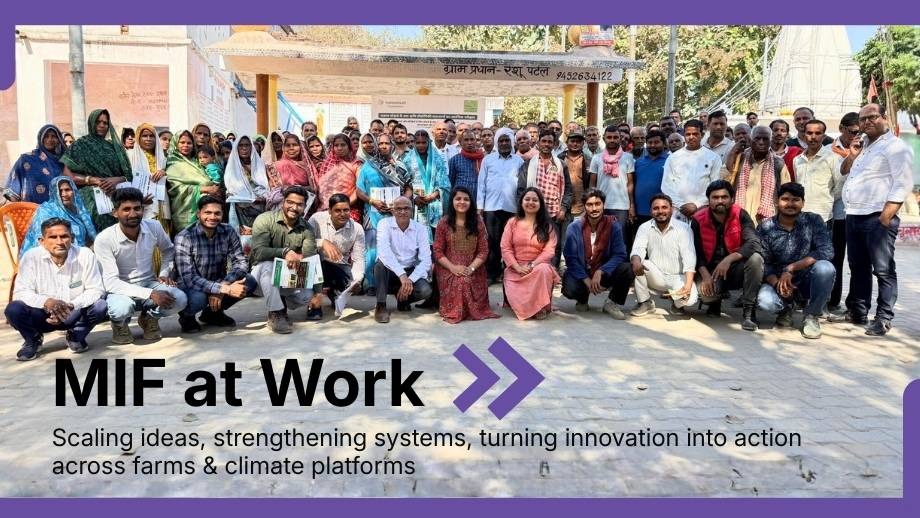
Scaling ideas, strengthening systems, and turning innovation into action across farms and climate platforms in India.
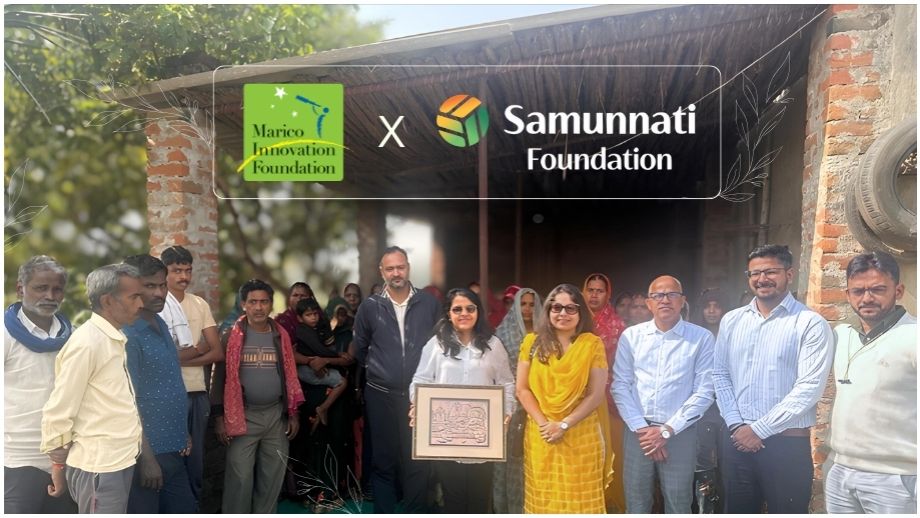
How MIF, Samunnati Foundation and agri-startups are piloting solutions in Mirzapur and Varanasi
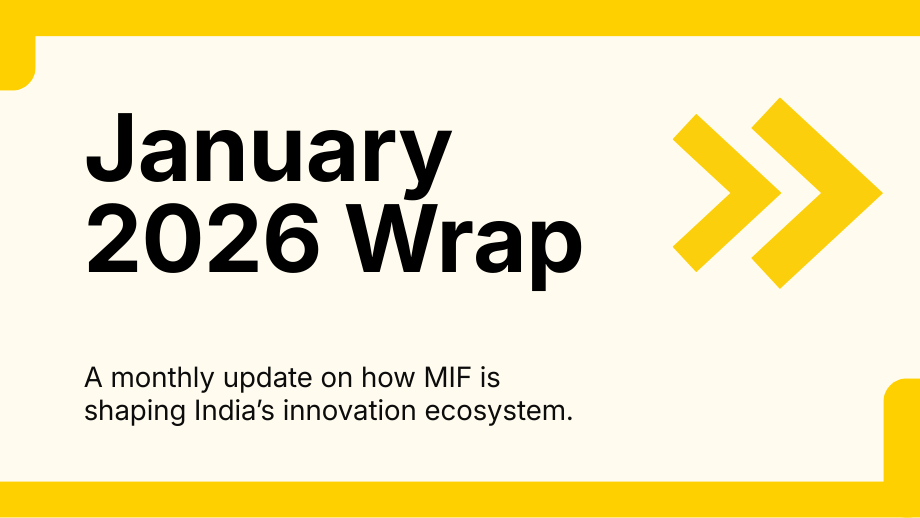
Milestones, lessons, and the work already underway at MIF

Get insights from entrepreneurs, investors, and change-makers on innovation,
success and what it takes to get there.
